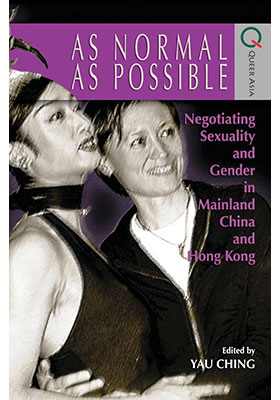As Normal as Possible
Negotiating Sexuality and Gender in Mainland China and Hong Kong
(順其自然:中國和香港對性與性別的評論)
ISBN : 978-962-209-987-6
June 2010
232 pages, 6″ x 9″, 21 color illus.
- HK$195.00
Ebooks
Also Available on
Drawing from the fields of ethnographic and sociological studies, cultural activism, public health and film studies, this volume poses new and exciting challenges to queer studies and demonstrates the study of Chinese sexuality as an emergent field currently emanating from multiple disciplines.
The essays here showcase the work of emerging and established scholars working mostly outside Euro-America and focus on cities including Hong Kong, Shanghai and Beijing. This book is one of the first sustained collections on Chinese non-normative sexual subjectivities and contemporary sexual politics published in English. It highlights the various ways in which different individuals and communities—including male sex workers, transsexual subjects, lesbians and Indonesian migrants—negotiate with notions of normativity and modernity, fine-tuned according to the different power structures of each context, and making new and different meanings.
“This is the first sustained collection of writings by established and young scholars on how sexualities are negotiated in Hong Kong and China. It is innovative and exciting, providing grounded empirical fieldwork as well as critical applications from the wider fields of literary historical studies, public health, cultural and film studies. It demonstrates the study of Chinese sexuality and queer modernity in Asia as emergent fields emanating from many disciplines.” —Audrey Yue, University of Melbourne
“These essays on GLBTQ Chinese culture provide exciting new insights into various aspects of contemporary culture in Hong Kong and Mainland China. The essays are rigorously researched and well written, making for a refreshing collection of high quality work. The strong Hong Kong dimension counters a certain North Chinese and/or North American dominance in work on Chinese GLBTQ topics as a whole.” —Chris Berry, Goldsmiths, University of London





